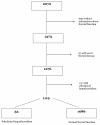Subclinical hyperthyroidism and dementia: the Sao Paulo Ageing & Health Study (SPAH)
- PMID: 20515500
- PMCID: PMC2887825
- DOI: 10.1186/1471-2458-10-298
Subclinical hyperthyroidism and dementia: the Sao Paulo Ageing & Health Study (SPAH)
Abstract
Background: Several epidemiologic studies have shown a possible association between thyroid function and cognitive decline. Our aim was to evaluate the association of subclinical hyperthyroidism and dementia in a population sample of older people
Methods: A cross-sectional study--São Paulo Ageing & Health Study (SPAH)--in a population sample of low-income elderly people > or = 65 years-old to evaluate presence of subclinical thyroid disease as a risk factor for dementia. Thyroid function was assessed using thyrotropic hormone and free-thyroxine as well as routine use of thyroid hormones or antithyroid medications. Cases of dementia were assessed using a harmonized one-phase dementia diagnostic procedure by the "10/66 Dementia Research Group" including Alzheimer's disease and vascular dementia. Logistic regression models were used to test a possible association between subclinical hyperthyroidism and dementia.
Results and discussion: Prevalence of dementia and of subclinical hyperthyroidism were respectively of 4.4% and 3.0%. After age adjustment, we found an association of subclinical hyperthyroidism and any type of dementia and vascular dementia (Odds Ratio, 4.1, 95% Confidence Interval [95% CI] 1.3-13.1, and 5.3 95% CI, 1.1-26.4; respectively). Analyzing data by gender, we found an association of subclinical hyperthyroidism with dementia and Alzheimer's disease only for men (OR, 8.0; 95% CI, 1.5-43.4; OR, 12.4; 95% CI, 1.2-128.4; respectively). No women with subclinical hypothyroidism presented Alzheimer's disease in the sample.
Conclusion: The results suggest a consistent association among people with subclinical hyperthyroidism and dementia.
Figures
Similar articles
-
Subclinical Thyroid Dysfunction and the Risk of Cognitive Decline: a Meta-Analysis of Prospective Cohort Studies.J Clin Endocrinol Metab. 2016 Dec;101(12):4945-4954. doi: 10.1210/jc.2016-2129. Epub 2016 Sep 30. J Clin Endocrinol Metab. 2016. PMID: 27689250 Free PMC article. Review.
-
Prevalence of thyroid disorders among older people: results from the São Paulo Ageing & Health Study.Cad Saude Publica. 2011 Jan;27(1):155-61. doi: 10.1590/s0102-311x2011000100016. Cad Saude Publica. 2011. PMID: 21340114
-
Association between subclinical thyroid dysfunction and depressive symptoms in the Korean adult population: The 2014 Korea National Health and Nutrition Examination Survey.PLoS One. 2018 Aug 14;13(8):e0202258. doi: 10.1371/journal.pone.0202258. eCollection 2018. PLoS One. 2018. PMID: 30106989 Free PMC article.
-
Frequency of subclinical thyroid dysfunction and risk factors for cardiovascular disease among women at a workplace.Sao Paulo Med J. 2010 Jan;128(1):18-23. doi: 10.1590/s1516-31802010000100005. Sao Paulo Med J. 2010. PMID: 20512276 Free PMC article.
-
Subclinical hyperthyroidism and the risk of dementia: A meta-analysis.Brain Behav. 2024 Sep;14(9):e70037. doi: 10.1002/brb3.70037. Brain Behav. 2024. PMID: 39295103 Free PMC article.
Cited by
-
Clinical review: The thyroid in mind: cognitive function and low thyrotropin in older people.J Clin Endocrinol Metab. 2012 Oct;97(10):3438-49. doi: 10.1210/jc.2012-2284. Epub 2012 Aug 3. J Clin Endocrinol Metab. 2012. PMID: 22865905 Free PMC article.
-
The association between subclinical thyroid dysfunction and dementia: The Health, Aging and Body Composition (Health ABC) Study.Clin Endocrinol (Oxf). 2017 Nov;87(5):617-626. doi: 10.1111/cen.13458. Epub 2017 Sep 14. Clin Endocrinol (Oxf). 2017. PMID: 28850708 Free PMC article.
-
Association of Hypothyroidism and the Risk of Cognitive Dysfunction: A Meta-Analysis.J Clin Med. 2022 Nov 14;11(22):6726. doi: 10.3390/jcm11226726. J Clin Med. 2022. PMID: 36431204 Free PMC article. Review.
-
Subclinical Thyroid Dysfunction and the Risk of Cognitive Decline: a Meta-Analysis of Prospective Cohort Studies.J Clin Endocrinol Metab. 2016 Dec;101(12):4945-4954. doi: 10.1210/jc.2016-2129. Epub 2016 Sep 30. J Clin Endocrinol Metab. 2016. PMID: 27689250 Free PMC article. Review.
-
A cross-sectional study on thyroid status in North Indian elderly outpatients with dementia.Ann Indian Acad Neurol. 2013 Jul;16(3):333-7. doi: 10.4103/0972-2327.116916. Ann Indian Acad Neurol. 2013. PMID: 24101811 Free PMC article.
References
-
- Volpato S, Guralnik JM, Fried LP, Remaley AT, Cappola AR, Launer LJ. Serum thyroxine level and cognitive decline in euthyroid older women. Neurology. 2002;58:1055–61. - PubMed
Publication types
MeSH terms
Grants and funding
LinkOut - more resources
Full Text Sources
Medical


